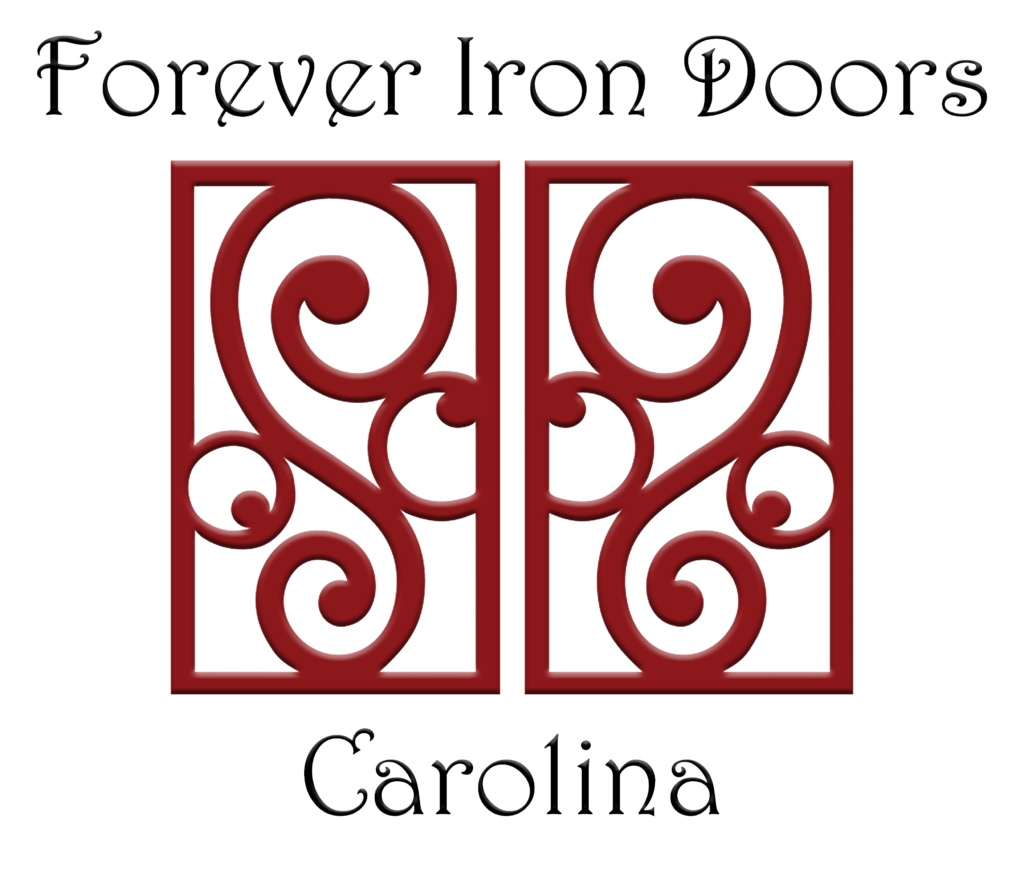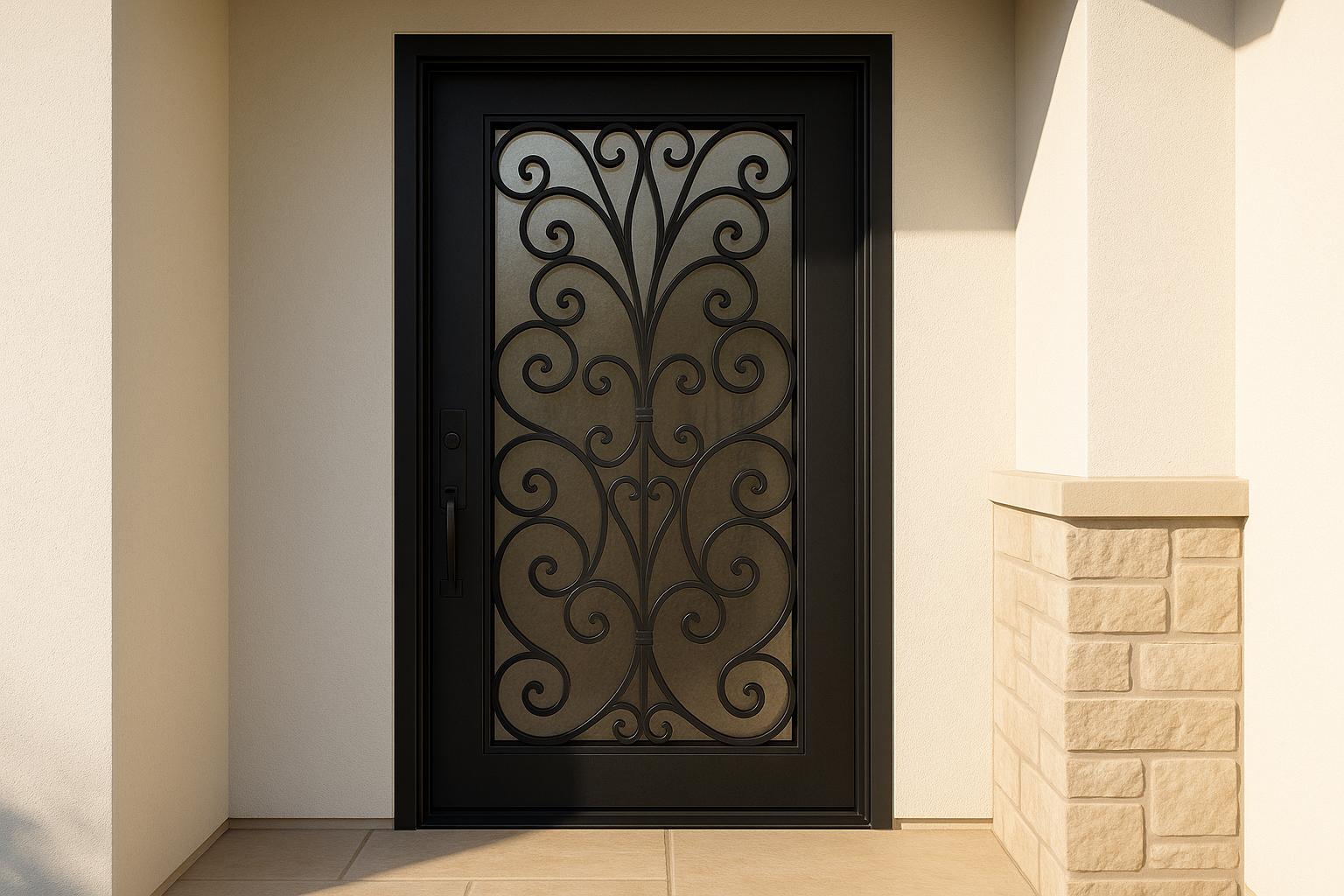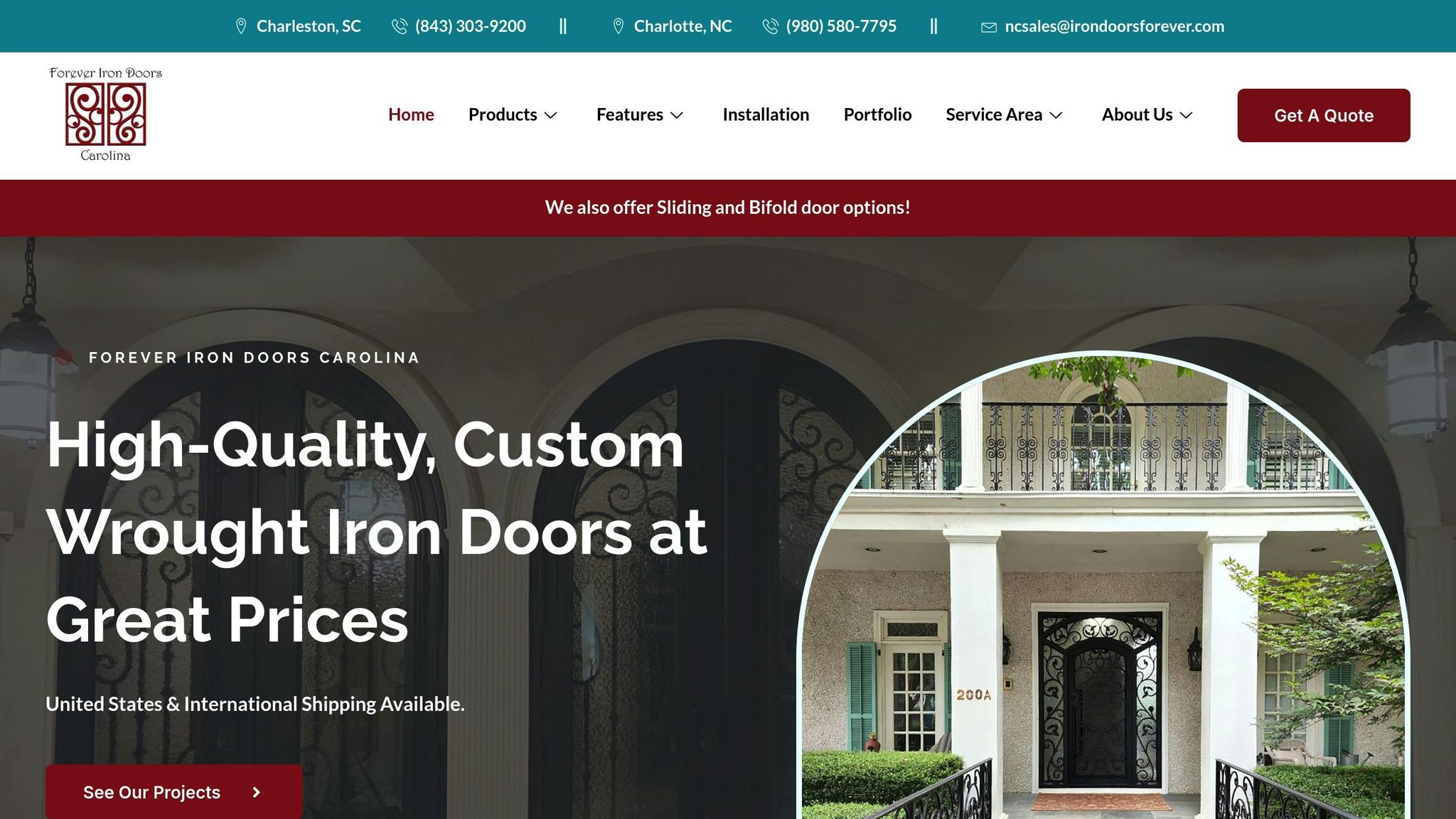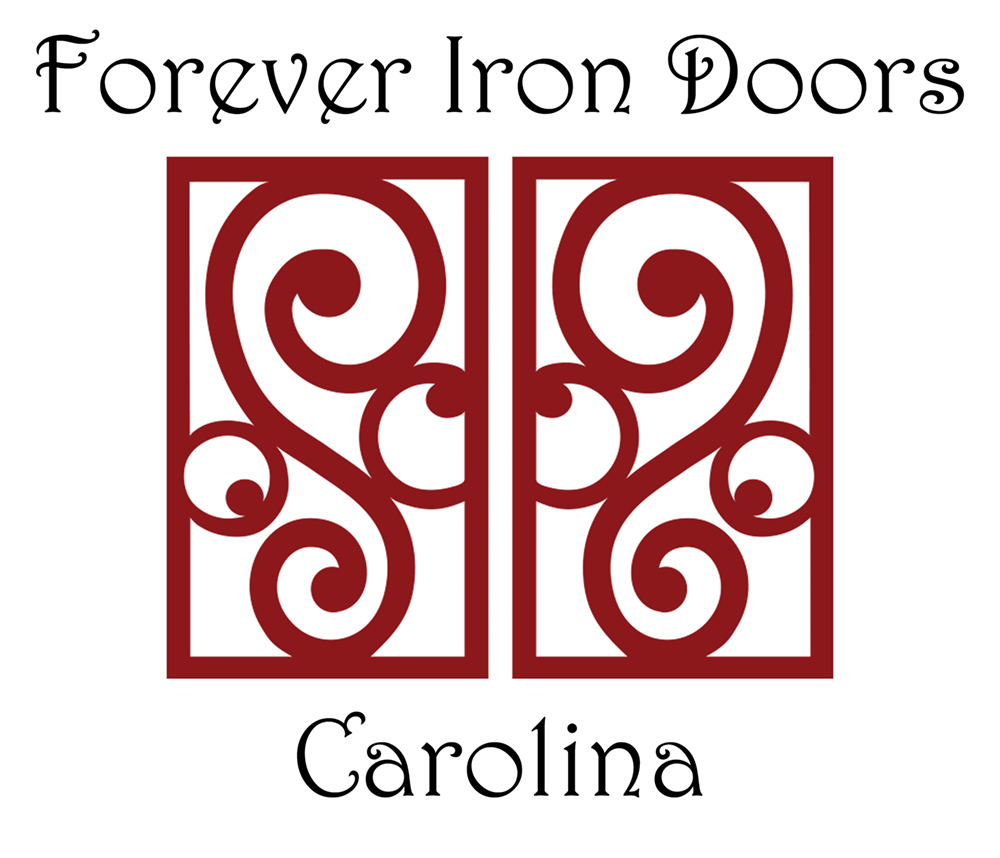Planning to install custom iron doors? Here’s what you need to know:
- Costs: Prices range from $3,000 to $10,000+, depending on design and features. Installation adds $250 to $1,000+.
- Key Factors: Door size, material quality, glass type, and hardware heavily influence the price. For example, premium finishes and intricate designs can double costs.
- Installation Challenges: Remodels often require extra work like frame adjustments or permits, increasing expenses.
- Professional Help: Hiring experts ensures proper measurements, seamless installation, and adherence to local building codes.
Pro Tip: Prioritize security and durability over decorative features. Request detailed quotes to avoid hidden fees and stay on budget.
Determining Your Project Needs and Scope
Before diving into budgeting, take the time to clearly outline what your custom iron door project entails. Think about your space, decide on the features that are most important to you, and factor in any professional services you’ll need. Laying out these details early helps you avoid unexpected expenses later and ensures a smoother transition from planning to implementation.
Measuring Your Entryway Requirements
Accurate measurements are the backbone of a successful custom iron door installation. Start by using a measuring tape and level to check if your entryway is square. Sketch out the doorway and measure every dimension twice to ensure accuracy. For a standard flat-top door, measure the height from the finished floor to the top inner trim and the width from the inner edge of the left trim to the inner edge of the right trim. If your entryway isn’t perfectly square, measure the top and bottom widths as well as the height on both sides, then use the largest measurements.
For arched or round-top doors, you’ll need additional measurements. Measure from the floor to the point where the arch begins and then to the highest point of the arch. Don’t overlook practical details like the direction the door opens, hinge placement, and the thickness of your current door – most exterior doors are about 1.75 inches thick.
Custom Features to Consider
Custom iron doors come with a variety of options that can influence both the cost and the overall aesthetic of your home. It’s important to choose features that align with your home’s style and your functional needs.
One major consideration is glass type. Glass can affect how much natural light enters your home and the level of privacy you have. Clear glass lets in the most light, while frosted or textured options – like Rain, Reeded, or Flemish – offer more privacy. For a unique look, you can explore specialty glass options like green tinted, sea glass, or tea-colored varieties.
The thickness of the iron used in your door also impacts both durability and price. While 14- or 16-gauge iron is common, 12-gauge iron provides better resistance to dents and bending. Additionally, the door’s finish plays a big role in both appearance and protection. Finishes like powder coating or zinc galvanization not only enhance the look but also help prevent rust in humid environments. Popular colors include Black and Bronze, but you can also opt for distinctive finishes like Veined Iron Gray, Ice Cracked Bronze, or Copper.
Hardware is another key detail. Handles such as Cathedral, Roman, or Palladian styles can enhance your door’s style while providing functionality and security. Choose hardware that complements your home’s design for a cohesive look.
| Feature Category | Available Options | Key Considerations |
|---|---|---|
| Glass Types | Clear, Frosted, Rain, Reeded, Ripple, Aquatex, Diamond, Flemish, Green Tinted, Sandblast, Sea Glass, Tea, Watercubed | Light transmission, privacy, aesthetic appeal |
| Finishes | Black, Bronze, Veined Iron Gray, Honey, Oxford, Walnut, Copper, Ice Cracked Bronze, Oak | Weather resistance, maintenance, style |
| Hardware | Cathedral, Roman, Palladian handles | Ergonomics, security, design harmony |
Once you’ve chosen your features, professional expertise will ensure everything comes together seamlessly.
Including Professional Services
Professional services are a key part of any custom iron door project. They ensure your vision is brought to life while meeting design, safety, and performance standards. Design and fabrication experts can help you balance your ideas with practical considerations like local building codes, structural requirements, and weatherproofing, helping you avoid costly mistakes.
Skilled installers take care of structural adjustments, ensure proper sealing against the elements, and make sure your door operates smoothly. They also handle permits and any electrical work that might be needed. To avoid surprises, get detailed quotes for all services upfront. Companies like Forever Iron Doors Carolina offer end-to-end services, from design to installation, ensuring a streamlined process and consistent quality. Many professional services also include warranties and ongoing support, giving you peace of mind and protecting your investment over the long term.
Estimating Costs and Understanding Price Factors
Getting a clear picture of the financial commitment involved in custom iron doors can help you plan better and avoid unexpected expenses. Costs can vary widely based on your preferences, but understanding typical price ranges and the factors that influence them will give you a solid starting point.
Typical Price Ranges
Custom iron door prices range broadly. Basic models might start at around $2,000, while more ornate, high-end designs can go beyond $11,000. Standard-sized wrought iron doors generally fall between $1,500 and $5,000. If you include professional installation – covering a single door or smaller double-door setup with glass, hardware, and labor – total project costs typically begin around $10,000. This wide range reflects differences in design, materials, and other customizations.
Now, let’s break down the main factors that influence these prices.
Main Cost Drivers
Several factors play a big role in determining how much you’ll spend:
- Design Complexity: Intricate ironwork and detailed patterns require skilled craftsmanship and more time to produce. These designs often double the labor compared to simpler styles.
- Door Size: Larger doors demand more materials and structural support. Oversized installations may also require special equipment and additional labor. Double doors naturally increase material and hardware costs.
- Material Quality: Higher-grade wrought iron, known for its durability and resistance to rust, comes at a premium compared to lower-grade options.
- Glass Options: Basic clear glass is more affordable, but specialty glass – like beveled, stained, or leaded – can significantly raise costs, especially with larger or multiple panels.
- Hardware and Finishes: Handles and locks can range from $40 to $500, with high-end smart locks and premium hardware adding to the price. Decorative finishes like brushed nickel, oil-rubbed bronze, or matte black can increase costs by 25–50% compared to standard powder coatings [35,36].
Here’s a quick comparison of how these features can affect your overall budget:
Cost Comparison for Features
| Feature Category | Basic Option | Premium Option | Cost Impact |
|---|---|---|---|
| Glass Panels | Clear glass | Beveled, stained, or leaded glass | Adds $300–$1,000+ |
| Hardware | Standard handles/locks ($40–$100) | Smart locks/premium hardware ($200–$500+) | Adds $160–$400+ [35,36] |
| Finishes | Standard powder coating | Premium finishes (e.g., brushed nickel) | 25–50% price increase |
| Decorative Elements | Simple patterns | Intricate custom designs | May double production costs |
Accessories can also influence your budget. For instance, deadbolts range from $30 to $200, while decorative items like knockers, mail slots, and house numbers typically cost $10 to $100 each. Premium materials, such as brass or bronze, push these prices higher [32,35]. Additionally, smart locks and electronic access systems are becoming more popular, with costs ranging from $120 to $500 or more.
Finally, keep in mind that shipping fees and structural modifications for installation can add to the overall expense.
Planning for Installation and Additional Expenses
Once you’ve estimated the cost of your door and its features, it’s time to plan for installation and any additional expenses. These costs can often take homeowners by surprise, but careful preparation will help you stick to your budget.
Installation Costs Breakdown
Installation costs can differ significantly depending on whether your project involves new construction or a remodel. For new construction, installation tends to be more straightforward, with costs typically falling between $250 and $500. This process involves fitting the door into a pre-prepared opening, usually without any major complications.
On the other hand, remodel installations are more complex and can cost anywhere from $500 to $1,000. This higher price accounts for the extra work involved, such as removing old doors and adjusting or repairing frames. Labor costs for these installations vary depending on the professional you hire. General installation labor typically runs between $30 and $90 per hour, while handyperson services range from $50 to $150 per hour. For a basic steel entry door, labor costs generally range from $160 to $250. However, custom iron doors often require specialized expertise, which can drive these rates higher.
Several factors influence installation costs, including the door’s size, weight, and the condition of the frame. Larger or heavier doors may require additional support, special equipment, or even frame reinforcement. Additionally, if your project includes features like smart locks that need electrical wiring or plumbing adjustments, these complexities can increase labor charges.
Once you’ve accounted for installation fees, it’s important to consider other add-ons that could impact your overall budget.
Budgeting for Add-Ons
Additional costs for hardware and structural modifications can enhance both the functionality and appearance of your door but should be factored into your budget.
- Hardware Costs: Basic hinges cost between $10 and $20 per door, while knobs range from $10 to $50. Deadbolt locks can add another $120 to $220 to your budget. Installing these components may cost an additional $30 to $60 per knob or lock and $4 to $6 per hinge.
- Structural Modifications: If your project requires a new rough frame, expect to pay between $130 and $320 total, or $7 to $20 per linear foot. Modifying a load-bearing wall may also require building permits and structural engineering plans, which can cost anywhere from $250 to $1,000.
- Cleanup and Disposal: Removing an old door typically costs $70 to $200, while disposal fees range from $25 to $50.
- Utility Rerouting: If your installation involves rerouting utilities, plumbing work may cost $45 to $150 per hour, and electrical modifications could range from $50 to $130 per hour.
- Finishing Touches: Painting an exterior door usually costs between $125 and $225. Installing a threshold adds another $25 to $50. If building permits are required for exterior modifications, fees typically range between $30 and $120.
Working with experienced professionals, such as Forever Iron Doors Carolina, can help you anticipate and plan for these costs. Their expertise allows them to assess your specific needs, identify necessary structural work, and provide detailed quotes that account for any installation challenges. This approach not only helps you avoid unexpected expenses but also ensures your project meets all safety and building code requirements.
sbb-itb-cd90297
Tips to Avoid Overspending and Get the Most Value
Making smart financial decisions when purchasing custom iron doors starts with careful planning. By focusing on what matters most, getting clear estimates, and working with seasoned professionals, you can stay within your budget while still making a worthwhile investment.
Prioritizing Key Features
When selecting features, start with the essentials. Security and durability should take precedence over decorative upgrades. This is especially important since over 80% of break-ins happen through front or first-floor doors. Opt for 12-gauge iron construction for its strength against dents, reinforced locks, tamper-resistant hinges, and rust-resistant finishes like powder coating or zinc galvanization. These features not only protect your home but also enhance its overall value.
For design, stick to simple, classic door styles to keep costs down. You can always add decorative touches later, but upgrading the core structure and security features after installation is much more difficult and costly.
If you want a blend of style and functionality, consider iron and glass combinations. These allow natural light to enter your home without compromising security. To save on energy costs, look for energy-efficient cores and proper weather stripping. These features can reduce utility bills over time, essentially paying for themselves.
Once you’ve chosen the right features, the next step is ensuring you get clear and accurate pricing.
Requesting Detailed Quotes
Detailed quotes are essential to avoid surprise expenses and understand exactly what you’re paying for. Ask for itemized breakdowns covering materials, labor, hardware, and any additional services. Some contractors include extras like frame modifications and site cleanup in their base price, while others may charge separately for these.
Comparing multiple quotes can help you spot any inconsistencies, such as unusually high or low prices, which might hint at hidden fees or quality concerns.
Additionally, request clear timelines and payment schedules. Knowing when payments are due and how long the project will take helps you manage your finances and ensures you’re not paying large sums before work begins.
Collaborating with experienced professionals can further protect your investment.
The Value of Working with Experts Like Forever Iron Doors Carolina
Experienced professionals can make a significant difference in both the quality and cost-effectiveness of your project. Proper installation is key to ensuring your door fits perfectly and is sealed correctly, which directly impacts both security and energy efficiency. Poor installation can lead to issues like air leaks or weakened security, potentially costing you more in repairs down the line.
Companies like Forever Iron Doors Carolina stand out for their transparent pricing, helping you avoid hidden fees and stay on budget. Their expertise in custom fabrication allows them to suggest affordable alternatives that align with your design goals without unnecessary expenses.
Beyond immediate benefits, expert installation can also increase your home’s resale value. Wrought iron doors are known to enhance curb appeal, which can contribute up to 7% of a home’s sale price. Additionally, proper installation can improve energy efficiency, reducing energy costs by as much as 30%. These savings can help offset the initial investment over time.
Forever Iron Doors Carolina takes a comprehensive approach, handling everything from design to installation. This eliminates the need to coordinate multiple contractors, reducing complications and often leading to better pricing. With their expertise and streamlined process, you can ensure careful planning and high-quality results while sticking to your budget.
Conclusion: Key Points for Budgeting Success
Budgeting for custom iron doors requires careful planning, realistic expectations, and informed choices to ensure your home gets both the security and curb appeal it deserves.
Start by measuring your entryway and deciding on the custom features you want. Keep in mind that installation costs can vary depending on the project and should be included in your budget planning. Setting a clear budget upfront and communicating your requirements helps prevent unexpected expenses.
Focus on essential security features first, and always ask for itemized quotes to avoid hidden costs. Prioritize high-quality hardware and necessary safety elements before considering decorative upgrades.
Collaborating with experienced professionals, like Forever Iron Doors Carolina, can make the process smoother and more efficient. Their end-to-end services – covering design, manufacturing, and installation – help streamline your project while often delivering better pricing and results that align seamlessly with your vision. This approach simplifies your budgeting and ensures a well-managed project from start to finish.
FAQs
How can I make sure my custom iron door fits my entryway perfectly?
To make sure your custom iron door fits perfectly, begin by carefully measuring your entryway. Take precise measurements of the width, height, and depth of the door frame, and pay attention to any irregularities or obstacles that could affect the fit. It’s a good idea to consult with professionals who specialize in custom iron doors. They can walk you through the process, helping to ensure the design and installation are customized to your space. Plus, working with experts ensures the door is properly supported and built to last.
What are the best features to focus on for a custom iron door that balances security and style?
When choosing a custom iron door, it’s crucial to prioritize strong, weather-resistant materials. These materials ensure the door can stand up to the elements while providing reliable security for years to come.
If you’re looking to add a touch of elegance, consider incorporating decorative glass panels. Not only do they elevate the door’s design, but they also offer an additional layer of protection.
For those mindful of energy costs, look for features like double-insulated glass. This can help maintain indoor temperatures more effectively, potentially lowering your heating and cooling expenses over time. By focusing on these aspects, you can strike a balance between security, durability, and style – all without breaking the bank.
How can I ensure a clear and transparent budget when planning for a custom iron door project?
To keep your custom iron door project within budget and avoid surprises, begin by asking for a detailed written estimate. This should include a clear breakdown of costs like materials, labor, and installation. Don’t forget to inquire about any possible extra charges, such as delivery fees or customization expenses, right from the start.
Carefully go over the terms and conditions of the contract before signing anything. If something isn’t clear, make sure to get it clarified. Working with a company known for transparency and good communication can save you a lot of headaches. Check reviews or testimonials to ensure they have a solid track record of reliability.



